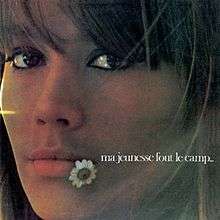Ma jeunesse fout le camp...
| Ma jeunesse fout le camp… | ||||
|---|---|---|---|---|
 | ||||
| Studio album by Françoise Hardy | ||||
| Released | 1967 (France) | |||
| Recorded |
Paris, France Studio Pye, London, United Kingdom | |||
| Genre | French pop | |||
| Length | 31:30 | |||
| Language | French | |||
| Label | Disques Vogue | |||
| Producer |
Françoise Hardy Jacques Wolfsohn Léon Cabat | |||
| Françoise Hardy chronology | ||||
| ||||
| Professional ratings | |
|---|---|
| Review scores | |
| Source | Rating |
| Allmusic | |
Ma jeunesse fout le camp… is a studio album by the French popular singer Françoise Hardy. Released in France in November 1967, on LP, Production Asparagus/Disques Vogue/Vogue international industries (CLD 720).
This album was the first produced by Hardy's own production company, Asparagus Productions. Manufacturing and distribution were still handled by Disques Vogue.[2]
Tracklist
Except as noted, words and music were written by Françoise Hardy, and she is accompanied by the Charles Blackwell orchestra.[3]
- "Ma jeunesse fout le camp" – 3:05
Lyrics and music written by: Guy Bontempelli
First performed by: Michèle Arnaud, 1962 - "Viens là" – 2:25
- "Mon amour adieu" – 2:20
Music written by: Hasell[4] - "La Fin de l’été" – 2:35
Original title: "À la fin de l’été… (Tu sais)"
Lyrics by: Jean-Max Rivière
Music written by: Gérard Bourgeois
First performed by: Brigitte Bardot, 1964 - "En vous aimant bien" – 2:15
Accompanied by: John Paul Jones - "Qui peut dire?" – 2:05
Accompanied by: Jacques Dutronc - "Des ronds dans l'eau" – 2:25
Lyrics by: Pierre Barouh
Music written by: Raymond Le Sénéchal
First performed by: Nicole Croisille and Annie Girardot, 1967[5] - "Il n’y a pas d’amour heureux" – 2:20
Lyrics: poem by Louis Aragon
Music written by: Georges Brassens
First performed by: Georges Brassens, 1953 - "Il est trop loin" – 3:40
Original title: "Sorrow"
Lyrics and music written by: Peter Yarrow and Noel “Paul” Stookey
First performed by: Peter, Paul and Mary, 1962
French adaptation by: Daniel Hortis and Danyel Gérard[6] - "Mais il y a des soirs" – 2:10
Accompanied by: John Paul Jones - "Voilà" – 3:20
Accompanied by: Jacques Denjean - "C’était charmant" – 1:55
Editions
LP records: first editions in anglosphere
-
 South Africa, 1968: Ma jeunesse fout le camp..., World Record Club (ORL 6016).
South Africa, 1968: Ma jeunesse fout le camp..., World Record Club (ORL 6016). -
 Australia, 1968: Ma jeunesse fout le camp..., Phono Vox (LPV 005).
Australia, 1968: Ma jeunesse fout le camp..., Phono Vox (LPV 005). -
 Canada, 1968: Ma jeunesse fout le camp…, Disques Vogue/Vogue international industries (VC 6020).
Canada, 1968: Ma jeunesse fout le camp…, Disques Vogue/Vogue international industries (VC 6020). -
 United Kingdom, 1968: Il n’y a pas d’amour heureux, United Artists Records (ULP 1191).
United Kingdom, 1968: Il n’y a pas d’amour heureux, United Artists Records (ULP 1191). -
 New Zealand, 1968: Ma jeunesse fout le camp…, Phono Vox (LPV 005).
New Zealand, 1968: Ma jeunesse fout le camp…, Phono Vox (LPV 005). -
 United States, 1969: Mon Amour Adieu, Reprise Records (RS 6345).[7]
United States, 1969: Mon Amour Adieu, Reprise Records (RS 6345).[7]
Reissue on CD
-
 France, 1995: Ma jeunesse fout le camp..., Kundalini/Vogue/Virgin Records (7243 8 40501 2 2).
France, 1995: Ma jeunesse fout le camp..., Kundalini/Vogue/Virgin Records (7243 8 40501 2 2).
Notes and references
- ↑ Allmusic review
- ↑ See the entry for Françoise Hardy on readysteadygirls.eu.
- ↑ Ma Jeunesse Fout Le Camp, overview, Allmusic. Accessed on line May 7, 2009.
- ↑ Instrumental entitled "Baby Goodbye".
- ↑ Song from the film Vivre pour vivre of Claude Lelouch. Sung in French by Annie Girardot and in English by Nicole Croisille: "Now you want to be loved" (Sonny Miller), Disc' AZ (EP1144), 1967.
- ↑ Danyel Gérard was the first performer of the French version titled "Elle est trop loin", Disc' AZ, (EP 941 Medium), 1963.
- ↑ Les titres "Qui peut dire ?" et "Voilà" sont remplacés par "Je ne sais pas ce que je veux" et "Avec des si".
| ||||||||||||||||||
This article is issued from Wikipedia - version of the Saturday, August 22, 2015. The text is available under the Creative Commons Attribution/Share Alike but additional terms may apply for the media files.